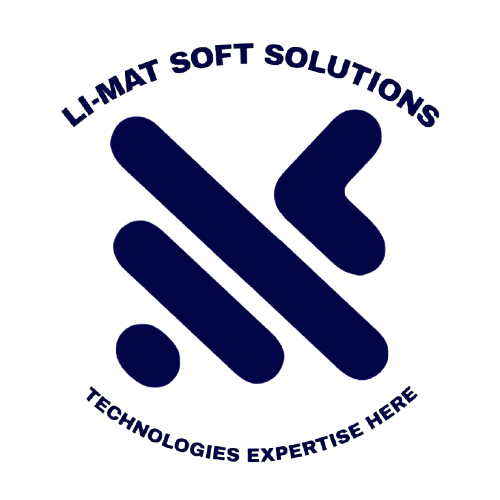Angular JS Certification Training:
Become a web development expert with AngularJS. Master Angular components, data binding, routing, forms, authentication, and much more.
- Expert-led interactive sessions.
- 50+ hours of dedicated learning.
- Real-world projects and Certifications.
- 24/7 Support Group.
Overview
The Angular JS certification course from LI-MAT Soft Solutions is designed to provide students with the skills and knowledge required to thrive in web development with AngularJS. In today's ever-evolving digital landscape, the ability to create interactive and responsive web applications is paramount, and AngularJS stands as a critical technology in achieving this goal. This comprehensive course caters to seasoned developers aiming to elevate their web development capabilities and newcomers eager to explore the world of front-end development LI-MAT Soft Solutions provides this Angular JS certification course in Summer-Training-Internship.
The course begins with a thorough exploration of AngularJS fundamentals, covering essential topics such as the architecture of web applications, the significance of AngularJS, and a step-by-step guide to its installation and setup. You'll gain hands-on experience working with Angular modules, decorators, components, and directives, enabling you to create modular and maintainable code for web applications.
You will engage in practical assignments and real-world projects throughout your journey, applying your knowledge to solve authentic development challenges. We'll delve into data binding, animations, and component interaction to create dynamic and engaging user interfaces.
Our expert instructors, backed by extensive industry experience, will provide guidance and mentorship throughout your learning experience. Upon completing the course, you will be awarded an Angular JS Development Intern Certificate from LI-MAT Soft Solutions, validating your proficiency in building cutting-edge web applications using AngularJS.
Whether you're looking to embark on a career in front-end development, expand your skill set, or deepen your expertise in AngularJS, this course offers a tailored learning path suitable for all levels of learners. Join LI-MAT Soft Solutions and unlock the potential to craft innovative and responsive web applications with AngularJS.
Prerequisites:This course is suitable for beginners who understand the basics of web technologies like HTML, CSS, JavaScript, and OOPs Concepts. No experience with Angular JS is required.
- Expert-Led Live Interactive Sessions.
- 50+ hours of dedicated learning.
- Regular Assignments.
- Assessment (Quiz/Test).
- WhatsApp Support Groups.
- Class Recordings.
- Internship Grade projects and certification.
- Front-End Developer
- Angular Developer
- UI/UX Designer
- Web Application Developer
- JavaScript Developer
- Single-Page Application (SPA) Developer
- Front-End Architect
Upon completion of this Angular JS Certification course, you will be able to:
- Gain a comprehensive understanding of web development with Angular JS.
- Master the core concepts of Angular, including modules, decorators, and components.
- Effectively utilize Angular CLI for project management and development.
- Develop reusable user interface components using Angular.
- Implement data binding for dynamic and interactive user interfaces.
- Interact between Angular components through @Input and @Output decorators.
- Create engaging animations and transitions using Angular Animations.
- Understand the component life cycle and its significance in Angular applications.
- Apply Angular directives, including @Component, structural, and attribute directives.
- Harness the power of Angular pipes to transform and format data.
- Implement Angular services and understand the concept of dependency injection.
- Utilize observables for efficient data handling in Angular applications.
- Communicate with backend services using Angular's HTTPClient module.
- Develop robust and interactive forms with Angular.
- Validate forms effectively, both in template-driven and reactive forms.
- Implement user authentication and enhance application security.
- Manage application routes and navigation using the Angular Router.
- Secure your application through route guards and other security measures.
- Explore advanced topics such as Angular forms, authentication with JWT, and microservices.
- Perform unit testing of Angular components using Jasmine and Karma.
- Deploy Angular applications to production servers, including Nginx.
- Understand the concepts of version control and manage code with Git.
- Explore containerization using Docker for efficient application deployment.
- Create a Docker image and manage containers for your Angular applications.
- Undertake a comprehensive in-class project to apply your Angular skills in a real-world scenario.
Upon completing this course, you will possess the expertise to develop modern, dynamic web applications using Angular JS, making you a valuable asset in web development.
Why learn Angular JS?
Angular is an advanced frontend framework that is very contemporary, performance-efficient, and easy to learn. Because of its powerful features and capabilities, you may create dynamic and responsive web apps. Google supports Angular, which is written entirely in TypeScript. The ease of usage of the framework with MVC components makes it a popular technology. Furthermore, one of the best characteristics of the Angular framework is its versatility in using additional frameworks. With the widespread use of the Angular framework, application performance management has become community-driven, resulting in better career prospects.
- Angular is used by YouTube, Google, Nike, Samsung, Microsoft, BMW, and many other Fortune 500 firms to provide a compelling user experience.
- Angular provides the scalable infrastructure and productivity that powers Google's most excellent apps, from prototype to global deployment.
- According to Glassdoor, an Angular Developer earns ₹5,23,000 annually in India. The average additional cash compensation for an Angular Developer is 55,000, with a range of ₹21,250 - ₹1,37,500.
- Industry-Leading Framework:Angular JS is an industry-leading JavaScript framework backed by Google. It's widely recognized and adopted by tech giants and startups alike for building powerful web applications.
- High Industry Demand:Angular JS skills are highly sought in web development. By mastering Angular JS, you position yourself as a desirable candidate for leading tech companies.
- Versatile Application:Angular JS isn't limited to web development; it's versatile enough to be used in various application types, including dynamic web applications, single-page applications (SPAs), and progressive web apps (PWAs).
- Scalability:Angular JS is built to easily handle complex applications, making it an ideal choice for scalable projects. Learning Angular JS empowers you to create applications that can grow with your user base.
- Efficiency:Angular JS boasts a comprehensive ecosystem with tools and libraries that streamline development, leading to efficient and responsive applications.
- Supportive Community:The Angular JS community is vast and supportive. You'll find extensive documentation, active forums, and numerous libraries to aid in your learning journey.
In conclusion, enrolling in the Angular JS certification course provides you with the knowledge and skills to excel in web development, opening doors to exciting career prospects in this constantly evolving field. Whether you're a newcomer or a seasoned developer, Angular JS equips you with a valuable skill set to thrive in the ever-expanding web development landscape.
- Angular Architecture and CLI
- Work with TypeScript
- Authentication using JWT
- Angular Components and Databinding
- Use Built-in and Custom Pipes
- Angular Routes and Navigation
LI-MAT Soft SolutionsAngular JS Training Description
Who should enrol in this training program?
This comprehensive Angular course is well-suited for a diverse range of professionals seeking to enhance their skills and proficiency in modern web development. It particularly benefits:
- Freshers and Upcoming Frontend Developers:Individuals new to the world of web development, especially those aspiring to become proficient in frontend (JavaScript) development.
- UI/UX Developers:UI/UX developers looking to augment their abilities in crafting dynamic and user-friendly web interfaces.
- Web Developers:Web developers keen to expand their expertise in frontend technologies, especially those aiming to master Angular for creating robust web applications.
- Software Developers:Software developers interested in incorporating Angular into their toolkit for building modern web solutions and applications.
- Developers Transitioning from Other UI Frameworks:Developers transitioning from other UI JavaScript frameworks, such as React or Vue, who wish to explore Angular's capabilities for user interface development and enrich their skill set In summary, this training program is inclusive and suitable for professionals looking to harness the power of Angular JS to build efficient and scalable applications. Whether you're a beginner or an experienced developer, this course offers valuable insights and hands-on experience in Angular JS.
Is Pursuing a Career as an Angular Developer a Lucrative Choice?
The career prospects for Angular Developers have soared dramatically, paralleling the surging popularity of Angular programming on a global scale. Angular stands out as a premier web development framework, coveted for its versatility in building websites catering to diverse sectors, including social media, eCommerce, travel, and beyond. For individuals passionate about propelling their careers to new heights by embracing cutting-edge trends and technologies in web development, embarking on a journey to acquire an Angular certification is a rewarding step forward. Here are a few key reasons why a career as an Angular Developer holds immense promise:
- Explosive Demand:The demand for skilled Angular Developers is at an all-time high, with businesses worldwide actively seeking professionals well-versed in this robust framework.
- Versatility Across Industries:Angular's adaptability transcends industry boundaries, making it an invaluable asset for developing websites that meet various sectors' requirements.
- Professional Advancement:As Angular evolves, staying ahead of the curve is essential for career growth. Earning an Angular certification demonstrates your commitment to staying current with industry standards.
- Global Relevance:Angular enjoys international recognition, opening doors to career opportunities and job prospects beyond geographical boundaries.
- Innovation in Web Development:Embracing Angular signifies your dedication to embracing innovation and best practices in web development, positioning you as a valuable asset in the tech industry.
In summary, embarking on a career as an Angular Developer is a strategic move for individuals aspiring to thrive in the ever-evolving realm of web development. It promises exciting professional growth, opportunities, and the chance to contribute to the dynamic landscape of web technologies. Join our training program today and secure a career in angular development.
In Which Industries Is Angular Most Prevalent?
AngularJS, a formidable open-source JavaScript framework, boasts the backing of Google itself. Numerous industry giants have embraced AngularJS to bolster the user-facing facets of their applications. Here's a roster of companies that have seamlessly integrated Angular into their tech arsenal for cross-platform development:
LI-MAT Soft Solutions' Angular certification course is meticulously designed to equip students and professionals with mastery over Angular 12. This proficiency places them at the forefront of the highly competitive job market, ready to excel in their chosen careers.
What Are the Applications of Angular?
Angular is a dynamic open-source front-end framework renowned for using TypeScript, a development language that streamlines applications by eliminating superfluous features and code. JavaScript, widely regarded as the go-to language for client-side web applications, is seamlessly integrated into HTML documents, facilitating many interactions with web pages. Our Angular certification course is your comprehensive guide to harnessing Angular's capabilities, enabling you to construct dynamic, responsive, and interactive web applications. Throughout the course, you'll delve into core Angular concepts such as Angular Modules, Components, and Databinding. This knowledge equips you to create web applications that are both user-friendly and efficient, setting you on a path to success in the dynamic world of web development.
What Are the Key Benefits of Utilizing Angular?
Angular boasts a plethora of advantages that make it a preferred choice for web developers. Here are some of the key benefits of using Angular.
- Enhanced Performance and Speed: Angular's architecture is optimized for high performance, ensuring that web applications run swiftly and efficiently.
- High-Quality Applications: Angular's robust framework and extensive features facilitate the creation of high-quality, feature-rich web applications.
- Effective Cross-Platform Development: With Angular, you can seamlessly develop applications that function flawlessly across various platforms and devices.
- Readable and Testable Code: Angular encourages the development of clean and organized code, making it easy to read and test, leading to more robust applications.
- Lightweight Web Applications: Angular's modular architecture ensures that applications remain lightweight, resulting in faster load times and an improved user experience.
- Accelerated Development: The framework's tools and features expedite the development process, enabling developers to create applications more quickly.
- Efficient Problem-Solving Patterns: Angular employs efficient design patterns and methodologies, simplifying complex problem-solving tasks during development.
- Excellent Material Design Library: Angular offers a rich material design library that streamlines the creation of visually appealing and user-friendly interfaces, enhancing the overall user experience.
These advantages collectively make Angular a powerful tool for web developers, enabling them to build high-performance, feature-rich web applications efficiently and effectively."










